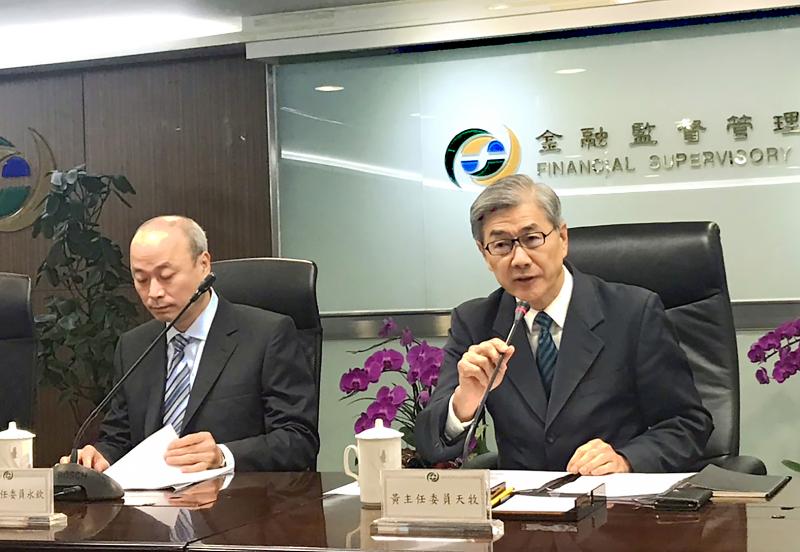The Financial Supervisory Commission (FSC) has reported Tatung Co (大同) chairwoman Lin Kuo Wen-yen (林郭文艷) to prosecutors for breach of trust, after a controversial shareholders’ meeting last week that led to impairment losses, the commission said yesterday.
The move is the financial regulator’s latest to address the fallout from Lin Kuo on Tuesday last week canceling the voting rights of 27 shareholders who own 53 percent of Tatung at its shareholders’ meeting.
After a week of review, the FSC has concluded that Lin Kuo and the company’s high-ranking executives breached Article 171 of the Securities and Exchange Act (證交法), as they allegedly caused at least NT$5 million (US$169,027) in damages to Tatung with the intent to benefit themselves, commission Chairman Thomas Huang (黃天牧) told a news conference.

Photo: Wang Meng-lun, Taipei Times
The FSC has collected evidence that indicates that Lin Kuo’s actions resulted in damages and delivered the files to prosecutors earlier this week, Securities and Futures Bureau Deputy Director Sam Chang (張振山) said.
The damages include funds that Tatung allegedly spent on arranging the shareholders’ meeting, which was too contentious to be accepted by government agencies, as well as the decline in Tatung’s share price as a result of the meeting, an FSC official said by telephone on the condition of anonymity.
Minority shareholders who objected to the actions of Tatung executives have applied to the Ministry of Economic Affairs (MOEA) to allow a new shareholders’ meeting to elect a new board directors, the official said.
If the MOEA accepts their application, Tatung would need to pay for the meeting, which would increase the damages, the official said.
It was the first time that the FSC had reported to a prosecutors’ office a publicly listed company for breach of trust due to a firm’s malpractice in shareholder services, Huang said.
The commission has previously targeted companies whose board members misappropriated corporate funds, Huang added.
Taiwan Depository and Clearing Corp’s (台灣集中保管結算所) investigation of the Tatung shareholders’ meeting is still ongoing, as it is still waiting for a response from Tatung, but the firm is expected to announce whether to bar the company from conducting shareholders’ services next week, Huang said.
“We understand that the public hopes that we can quickly solve the situation, but the Securities and Exchange Act does not offer us enough tools to do that,” Huang said.
However, the commission is considering amending rules to bar persons who severely breach corporate governance regulations from serving as chairpersons of companies that conduct initial public offerings on the main exchanges and to increase the transparency of the shareholder electronic voting system, so that shareholders can see voting results sooner, Huang said.
The FSC in the next three months is to consult with law experts to decide whether to amend the Securities and Exchange Act to give the commission more tools to punish firms for similar actions, Huang said.

SEMICONDUCTORS: The German laser and plasma generator company will expand its local services as its specialized offerings support Taiwan’s semiconductor industries Trumpf SE + Co KG, a global leader in supplying laser technology and plasma generators used in chip production, is expanding its investments in Taiwan in an effort to deeply integrate into the global semiconductor supply chain in the pursuit of growth. The company, headquartered in Ditzingen, Germany, has invested significantly in a newly inaugurated regional technical center for plasma generators in Taoyuan, its latest expansion in Taiwan after being engaged in various industries for more than 25 years. The center, the first of its kind Trumpf built outside Germany, aims to serve customers from Taiwan, Japan, Southeast Asia and South Korea,

Gasoline and diesel prices at domestic fuel stations are to fall NT$0.2 per liter this week, down for a second consecutive week, CPC Corp, Taiwan (台灣中油) and Formosa Petrochemical Corp (台塑石化) announced yesterday. Effective today, gasoline prices at CPC and Formosa stations are to drop to NT$26.4, NT$27.9 and NT$29.9 per liter for 92, 95 and 98-octane unleaded gasoline respectively, the companies said in separate statements. The price of premium diesel is to fall to NT$24.8 per liter at CPC stations and NT$24.6 at Formosa pumps, they said. The price adjustments came even as international crude oil prices rose last week, as traders

Taiwan Semiconductor Manufacturing Co (TSMC, 台積電), which supplies advanced chips to Nvidia Corp and Apple Inc, yesterday reported NT$1.046 trillion (US$33.1 billion) in revenue for last quarter, driven by constantly strong demand for artificial intelligence (AI) chips, falling in the upper end of its forecast. Based on TSMC’s financial guidance, revenue would expand about 22 percent sequentially to the range from US$32.2 billion to US$33.4 billion during the final quarter of 2024, it told investors in October last year. Last year in total, revenue jumped 31.61 percent to NT$3.81 trillion, compared with NT$2.89 trillion generated in the year before, according to

PRECEDENTED TIMES: In news that surely does not shock, AI and tech exports drove a banner for exports last year as Taiwan’s economic growth experienced a flood tide Taiwan’s exports delivered a blockbuster finish to last year with last month’s shipments rising at the second-highest pace on record as demand for artificial intelligence (AI) hardware and advanced computing remained strong, the Ministry of Finance said yesterday. Exports surged 43.4 percent from a year earlier to US$62.48 billion last month, extending growth to 26 consecutive months. Imports climbed 14.9 percent to US$43.04 billion, the second-highest monthly level historically, resulting in a trade surplus of US$19.43 billion — more than double that of the year before. Department of Statistics Director-General Beatrice Tsai (蔡美娜) described the performance as “surprisingly outstanding,” forecasting export growth